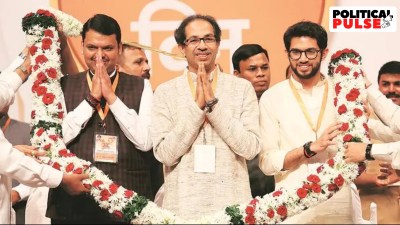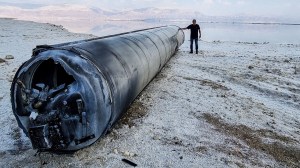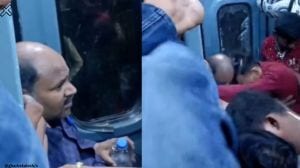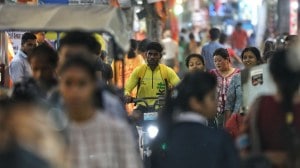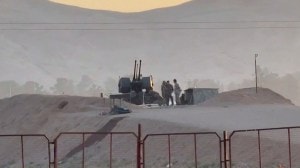- India
- International
At Home: Kashmir, NRC, Bengal top minister Shah’s agenda
It's 50 days since Amit Shah made the transition to the Modi government. With the powerful president of the BJP now holding the portfolio central to its pet agendas, what does it mean for the Home Ministry he has joined and the party that remains under his shadow.
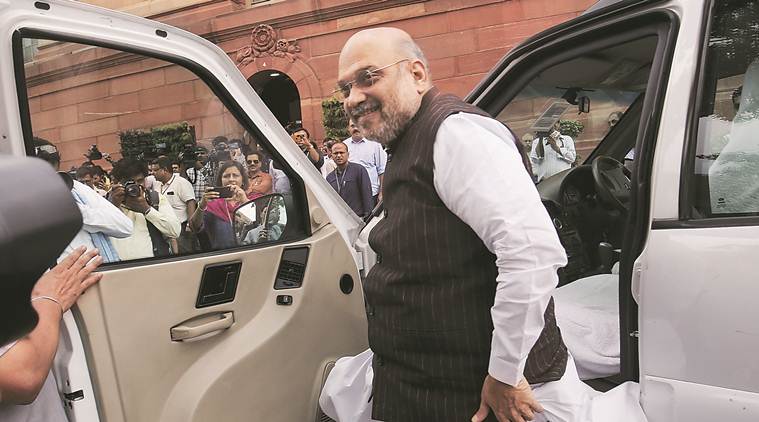 Home Minister Amit Shah at Parliament for ongoing session.
Home Minister Amit Shah at Parliament for ongoing session.
On June 26, holding a meeting at Srinagar’s Sher-e-Kashmir International Conference Centre on his maiden visit to Jammu and Kashmir, Home Minister Amit Shah asked a senior state police officer about security arrangements for the Amarnath Yatra set to begin soon.
“Sir, everything is in place. Ab bas aapka aashirwad chahiye (Just need your blessings now),” the officer replied with palpable excitement. “Main koi baba hoon jo aapko aashirwad doonga (Do I look like some holy man who will bless you)? Tell me in detail what has been done,” the Home Minister shot back. At another meeting, when the officer tried to impress the minister with statistics on terrorist killings, he earned another rebuke: “Don’t rattle off data. Give me the larger picture.”
The officer got the message and gave a detailed presentation on the security arrangements.
Saturday marked 50 days in office for Shah as Union Home Minister, the BJP president’s first stint in the Central government. Officials say the Srinagar anecdote, travelling fast through the security establishment and becoming a talking point in the bureaucracy in Delhi, is characteristic of his no-nonsense tenure.
Shah has underscored Kashmir and the contentious National Register of Citizens (NRC), two of the BJP’s pet ideological agendas, as top of his priority list. One of the first people to call on him after he took charge as Home Minister on June 1 was J&K Governor Satya Pal Malik. After courtesy calls by chiefs of various agencies and forces, Shah held his first formal internal security meeting on June 3 and went through detailed presentations by 19 divisions of the Home Ministry over the next few days, starting with J&K and the Northeast.

Among those he met were National Security Advisor (NSA) Ajit Doval, Intelligence Bureau Director Rajiv Jain and Research and Analysis Wing (R&AW) chief Anil Dhasmana. On June 4, the day Shah took briefings from Additional Secretary (J&K Division) Gyanesh Kumar and Joint Secretary (Northeast) Satyendra Garg, the National Investigation Agency (NIA) took into custody Kashmiri separatist leaders Masarat Alam, Asiya Andrabi and Shabbir Shah in connection with its terror funding case against Lashkar-e-Toiba chief Hafiz Saeed.
Days later, the Home Minister held a meeting with Assam Chief Minister Sarbananda Sonowal to discuss the NRC and Citizenship Amendment Bill.
On West Bengal too, the other front on which the BJP has been pushing, Shah has been unequivocal — so much so that the Trinamool Congress has complained about the number of times the state has been referred to in Parliament and alleged a political conspiracy.
Within Shah’s first 10 days, the Home Ministry issued an advisory to the Bengal government expressing “deep concern” over political violence in the state and underlining “failure on the part of the law enforcement machinery”. Shah also met West Bengal Governor Keshari Nath Tripathi for a briefing, with the Governor stressing later that speculation that they talked about President’s rule was wrong.
Tripathi hasn’t been the only governor to have called on Shah, who had met as many as 20, apart from over half-a-dozen chief ministers, within a fortnight in the ministry.
In his first interventions in Parliament as Home Minister too, Shah addressed the Kashmir problem and NRC, reaffirming the BJP’s position on the issues.
Read | Changes begin in BJP, but with Shah’s imprint
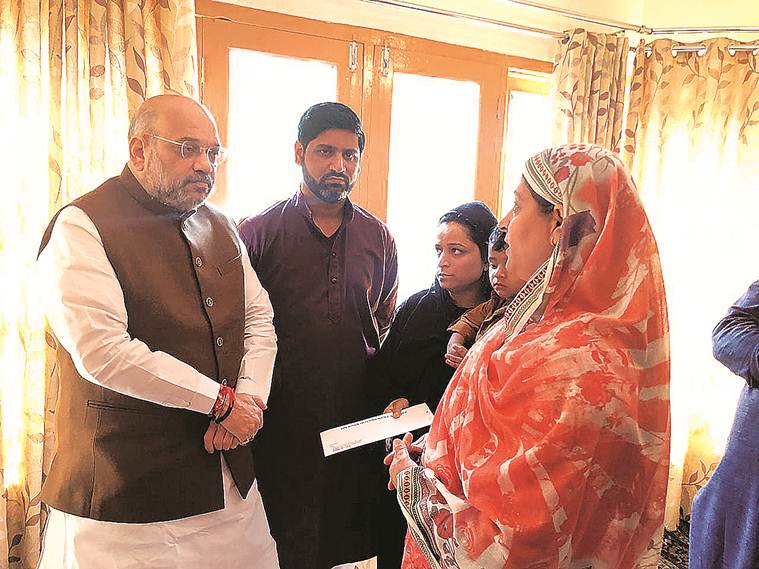 Amit Shah with panchayat members during a trip to J&K in June, where no overtures were made to separatists.
Amit Shah with panchayat members during a trip to J&K in June, where no overtures were made to separatists.
While the Home Minister is considered the natural No. 2 in the Union Cabinet, a series of incidents have settled any doubts regarding whether Rajnath Singh, who held the portfolio in the Modi I government and is now Defence Minister, continued to hold the privilege. One of Shah’s first meetings was with Foreign Minister S Jaishankar, Finance Minister Nirmala Sitharaman, Railways and Commerce Minister Piyush Goyal and Petroleum Minister Dharmendra Pradhan, in his office, to discuss petroleum trade issues with Mozambique.
Bureaucrats who had been apprehensive of Shah’s reputation of being a hard taskmaster as BJP president, have been proved wrong on one front. Contrary to speculation in Home Ministry corridors about largescale reshuffles, Shah has largely continued with the team that existed. Says a source close to the minister, “He believes all bureaucrats work for the government. Only when someone fails to perform will he or she be moved out.”
Officers say this continuity, including in the government’s agenda, helps. Talking about Shah, an officer in the Home Ministry says, “You may disagree with him, but you can’t deny he has great clarity of thought. That’s good for bureaucracy. There is a clear message about what the government wants.”
Read | Govt will identify and deport each illegal immigrant: Amit Shah
Another bureaucrat, who made a detailed presentation to the minister during the first few days, says, “He is sharp and focused. Many a time he doesn’t need briefings either, he knows the subject… The things he knows, he will fast forward. We thought it would take us three hours for our presentation, it was over in one hour.”
Even during the visit to J&K, Shah made no concessions for his transition from a party functionary to the government. During his two-day trip beginning June 26, while he held meetings with security forces, the state administration and newly elected panchayat members, no invitation was extended to either Mehbooba Mufti’s Peoples Democratic Party or Omar Abdullah’s National Conference, unlike during his predecessor Rajnath Singh’s visit. Sources say political outreach to separatists was never on the cards even though, in the run-up to Shah’s visit, Hurriyat leader Mirwaiz Umar Farooq had extended an olive branch of talks and the Governor had welcomed it. Shah did not meet any civil society groups either, nor did he take along Kashmir interlocutor Dineshwar Sharma. In fact, he chose to not even meet Sharma before his visit.
According to sources, Shah told security forces in J&K to crack down on terrorists and devise ways to wean local youth away from guns, as well as instructed the administration and panchayat members to help the 354 Central government schemes reach the grassroots.
An official who accompanied Shah during his visit says the messaging was deliberate. “There is so much focus on security that no one looks at the other big problems in Kashmir, lack of governance and corruption. Violence in Kashmir is actually limited to three districts, but governance is totally absent. Cartels associated with politicians bag projects, which keep hanging for years. Even tenders are not issued. The Centre is of the view that successive state governments have fallen miserably short of governance expectations. In the next one-and-a-half years, we will try to fix this.”
Later, in his reply to a debate on the resolution to extend President’s rule in J&K, both in the Lok Sabha on June 28 and the Rajya Sabha on July 1, Shah said, “As far as the question of Article 370 (on special status to J&K) is concerned, you must know that it is mentioned as temporary in the Constitution and not permanent. And this was done in agreement with Sheikh Abdullah.”
Read | Article 370 temporary provision, separatists in Valley scared: Amit Shah
Indicating that chances of any dialogue with Hurriyat leaders were slim, Shah also said the NDA government would “strike terror in the hearts of secessionists” and had zero tolerance for terrorism. “Those (in Kashmir) with anti-India thoughts should fear us. We are not members of the tukde-tukde gang.” In the Rajya Sabha though, he took a less hard line, saying he was not a pessimist and wanted to assure the House that “we will win the hearts of Kashmiri people”.
A Home Ministry official says, “In the Lok Sabha he was sending a message to the separatists. In the Rajya Sabha he was talking to the people of Kashmir.”
On the NRC, days after the Home Ministry filed an affidavit in the Supreme Court expressing doubts over the enumeration, Shah told the Upper House that they would identify illegal immigrants staying in any part of the country and deport them as per international law.
Over the past 50 days, what Shah has made clear is that he is not shy of either wielding the BJP’s brute majority in Parliament or championing the party’s pet issues, contentious as these may be, not allowing the Opposition an inch.
If the latter were in any doubt, this was cleared a couple of days ago. Moving amendments to the NIA Bill, Shah pounced on the demand for a voice division — incidentally by arch opponent Asaduddin Owaisi of the AIMIM. With a vote against the amendments certain to be portrayed by the BJP as a sign of its weakness on internal security issues, the Opposition voted with the government. The amendments went through: 278 to six votes.
Apr 20: Latest News
- 01
- 02
- 03
- 04
- 05











